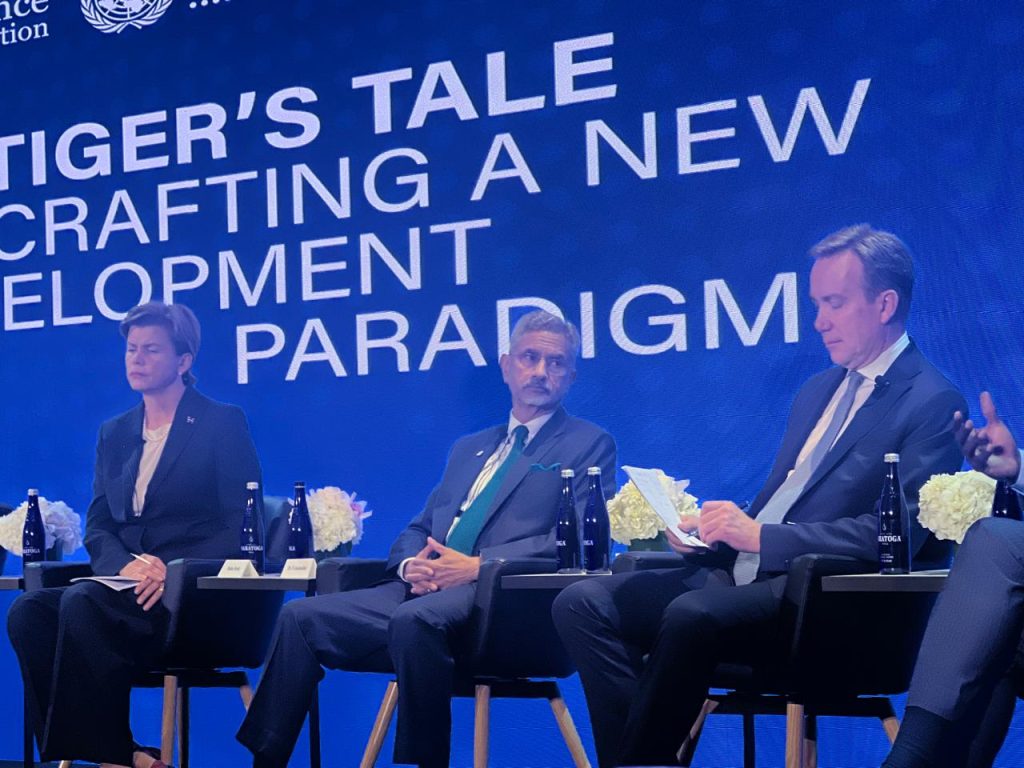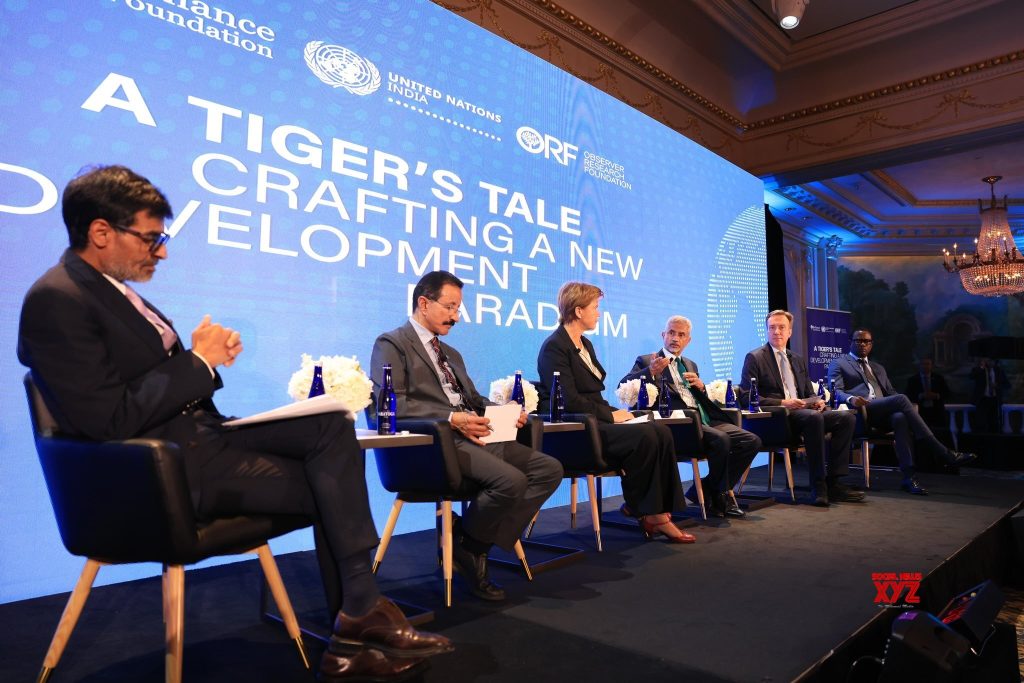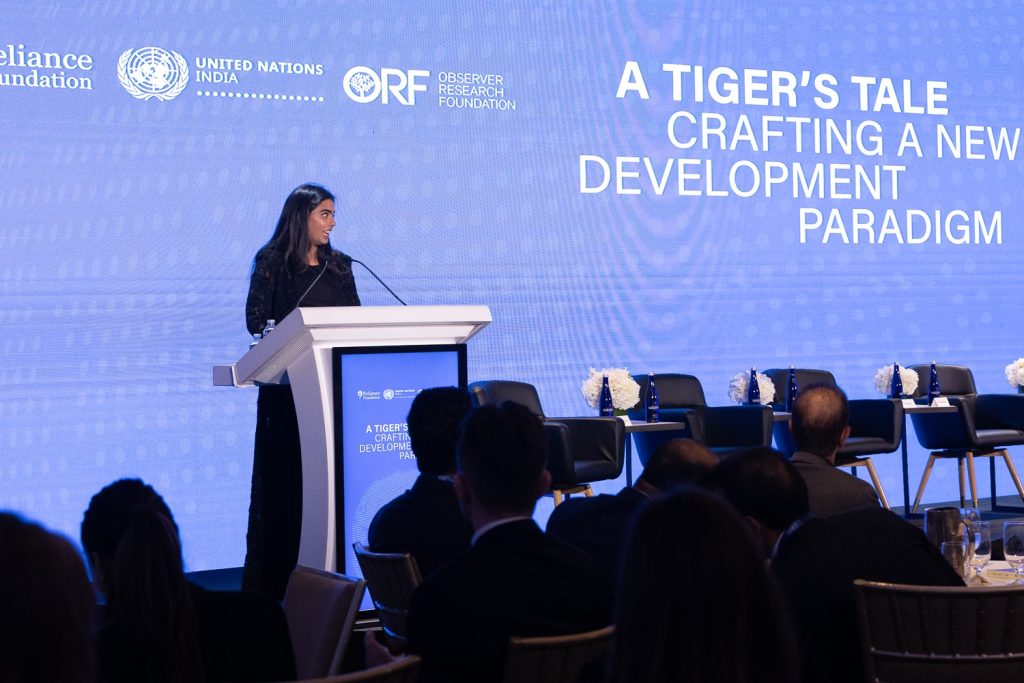
NEW YORK: The hunter and the hunted. And the power of narrative to shape the world order and global governance. At an aptly titled panel discussion titled “Tiger’s Tale: Crafting a New Development Paradigm”, India’s External Affairs Minister S. Jaishankar underscored the critical need for economic democratization, enhanced mobility, skill development, and connectivity as essential drivers to achieve the United Nations’ Sustainable Development Goals (SDGs). Speaking in New York as part of his US visit, Dr Jaishankar addressed global leaders and highlighted India’s leadership role in reshaping global governance, led by the Global South.
“As the global economy continues to face challenges, democratizing the economy, enhancing mobility, imparting skilling, and building connectivity are going to be key movers for achieving the SDGs,” Dr Jaishankar said during the discussion, which also featured eminent personalities, including Latvian Foreign Minister Baiba Braze, Guyana Foreign Minister High Hilton Todd, World Economic Forum President Borge Brende and DP World Chairman Sultan Ahmed bin Sulayem.
The panel discussion, curated by the Observer Research Foundation and curated by Dr Samir Saran, president, ORF, was designed as a platform to reimagine global development through the lens of the Global South, as the world grapples with a rapidly evolving geopolitical and economic landscape. The theme improvises on the much-cited African proverb “Until the lion learns how to write, every story will glorify the hunter,” signifying the power of narratives in shaping the world order. The discussion also highlighted the importance of developing nations reclaiming their narrative in global governance. For decades, the Global North has dominated global discourse, but emerging economies are now positioned to shape their own futures. The session sought to explore the role of nations, institutions, and the private sector in defining a development paradigm that meets the demands of the 21st century.
The discussion was framed around the idea that the Global South, once seen primarily as a subject of global governance, now has the power to influence its direction. “For decades, the story of global governance has been defined by the Global North,” Dr Jaishankar remarked. “But today, the developing world is more than a mere subject of global governance. They have retrieved the power to shape their own story.”
Spotlight on Global South

During his address, Dr Jaishankar underscored the importance of initiatives like India’s ‘Voice of the Global South’ Summits, which have provided a platform for developing nations to lead international cooperation and share innovative solutions for addressing common challenges. He emphasized that the developing world’s priorities, such as economic equity and sustainable development, should be at the forefront of global agendas.
“Leadership from the South is a reality. It is time for action that matches aspirations,” he stated, highlighting India’s commitment to driving development through international partnerships and consensus-building. He pointed out that India, along with other emerging economies like Indonesia, Brazil, and South Africa, has played a pivotal role in putting development squarely on the global agenda, particularly through their leadership in the G20.
Key Focus Areas
In line with the theme of the event, Dr Jaishankar outlined the key areas that are essential for achieving the UN’s SDGs: democratizing the economy, enhancing mobility, imparting skills, and building global connectivity. These, he argued, are crucial for reducing inequality and creating prosperous, sustainable societies.
“Economic democratization,” he explained, “is the cornerstone of ensuring that the benefits of growth are shared equitably among all nations, especially in the Global South.” The minister emphasized that outdated economic systems dominated by the wealthier nations need to be rethought, with a stronger focus on inclusivity.
The minister also discussed the critical role of skill development and mobility in ensuring that workers in developing countries are equipped to contribute meaningfully to the global economy. He reiterated that “skilling and enhancing mobility will ensure that people, especially those from developing countries, can contribute meaningfully to global growth.”
Connecting the Global South
A core aspect of the event’s discussions revolved around building better connectivity, not just in terms of physical infrastructure but also in terms of fostering deeper global economic and political linkages. Dr Jaishankar stressed the importance of ensuring that developing countries can collaborate more effectively with each other and with developed nations, fostering an ecosystem where no one is left behind.
Pact for the Future
The event coincided with the recent adoption of the ‘Pact for the Future’ at the UN General Assembly, a landmark agreement aimed at ensuring that international cooperation adapts to the challenges of the modern era. Dr Jaishankar praised the agreement, describing it as a vital step toward addressing critical issues such as climate change, sustainable development, and economic equity.
 “The Pact and its annexes provide new opportunities and untapped possibilities,” he noted, aligning India’s vision of global development with the framework laid out by UN Secretary-General Antonio Guterres.
“The Pact and its annexes provide new opportunities and untapped possibilities,” he noted, aligning India’s vision of global development with the framework laid out by UN Secretary-General Antonio Guterres.
Unlocking power of youth and women
Addressing an elite gathering at Marriott Hotel in New York, P. Harish, India’s Permanent Representative to UN focussed on the role of youth in global policy-making. The tale in the future will be told by young lions and cubs, said Mr Harish. Echoing similar thoughts, Isha Ambani, Director, Reliance Foundation, underscored the importance of unlocking the power of youth and women in setting the global agenda. What women can’t achieve can’t simply be done,” she said.
(Ananya Singh contributed inputs for this article)
Author Profile

- Manish Chand is Founder and Editor-in-Chief of India Writes Network (www.indiawrites.org) and India and World, a pioneering magazine focused on international affairs. He is CEO, Centre for Global India Insights, an India-based think tank focused on global affairs.
Latest entries
 India and the WorldFebruary 17, 2026South-by-South: Focus on people-centric solutions at India AI summit
India and the WorldFebruary 17, 2026South-by-South: Focus on people-centric solutions at India AI summit India and the WorldFebruary 7, 2026Modi hails interim India-US trade deal, Goyal says no concessions made on agriculture
India and the WorldFebruary 7, 2026Modi hails interim India-US trade deal, Goyal says no concessions made on agriculture India and the WorldFebruary 2, 2026Trump announces trade deal with India, Modi ‘delighted’
India and the WorldFebruary 2, 2026Trump announces trade deal with India, Modi ‘delighted’ India and the WorldJanuary 31, 2026Palestinian minister bats for mediatory role for India in ending Gaza conflict
India and the WorldJanuary 31, 2026Palestinian minister bats for mediatory role for India in ending Gaza conflict







